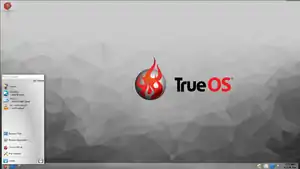Lumina (desktop environment)
Lumina Desktop Environment, or simply Lumina, is a plugin-based desktop environment for Unix and Unix-like operating systems. It is designed specifically as a system interface for TrueOS, and systems derived from Berkeley Software Distribution (BSD) in general,[2] but has been ported to various Linux distributions.[3]
 Lumina 1.0.0 on TrueOS | |
| Developer(s) | iXsystems, Inc. |
|---|---|
| Stable release | 1.6.0
/ February 1, 2020[1] |
| Repository | |
| Written in | C++ |
| Operating system | Unix and Unix-like |
| Type | Desktop environment |
| License | 3-clause BSD |
| Website | lumina-desktop |
History
Created in 2012 by Ken Moore, Lumina was initially a set of extensions to Fluxbox, a stacking window manager for the X Window System.[4] By late 2013, Moore had developed a graphical overlay for Fluxbox based on Qt4, and had created a utility for "launching applications and opening files".[4] The codebase was integrated into the PC-BSD source repository by early 2014, and a port was added to the FreeBSD Ports collection in April 2014.[4] The source code has since been moved to a separate GitHub repository "under the PC-BSD umbrella" and converted to use Qt5.[4] Development also focused on replacing the Fluxbox core with a Qt-based window manager integrated with the Lumina desktop.[4]
The project avoids use of Linux-based tools or frameworks, such as D-Bus, Polkit, and systemd.[5]
Features
The desktop and application menus are dynamically configured upon first being launched, as the desktop environment finds installed applications automatically to add to the menu and as a desktop icon.[3] The default panel includes a Start menu, task manager, and system tray, and its location can be customized.[3] Menus may be accessed via the Start menu or by right-clicking the mouse on the desktop background.[3]
Some features are specific to TrueOS, including hardware control of screen brightness (monitor backlight), preventing shutdown of an updating system, and integration with various TrueOS utilities.[2]
Utilities include: Insight, a file manager; File information, which reports a file's format and other details; and Lumina Open, a graphical utility to launch applications based on the selected file or folder.[3]
Version 1.4 included several new utilities.[6] The PDF reader lumina-pdf is based on the poppler library.[7] The Lumina Theme Engine replaced an earlier theme system; it enables a user to configure the desktop appearance and functionality, and ensures all Qt5 applications "present a unified appearance".[6]
Ports
Lumina has been ported to various BSD operating systems and Linux distributions. These include:
Notes
- "Lumina Desktop 1.6.0". Retrieved 16 May 2020 – via GitHub.
- Lumina FAQ.
- Watson 2016.
- Moore 2015.
- Lumina Desktop Environment homepage.
- Nestor 2017.
- Larabel 2017.
- Lumina 1.0 release.
- Freshports.
- "lumina-desktop added to repos – antiX Linux". antixlinux.com. Retrieved 2018-08-09.
- Arch Linux.
- https://www.linuxinsider.com/story/84301.html
References
- Larabel, Michael (23 November 2017). "Lumina 1.4 Desktop Environment Released". Phoronix. Retrieved 13 January 2018.CS1 maint: ref=harv (link)
- Moore, Ken (September 2015). "Basis Of The Lumina Desktop Environment". BSD Magazine. Retrieved 23 November 2016.CS1 maint: ref=harv (link)
- Nestor, Marius (22 November 2017). "Lumina 1.4 Desktop Environment debuts with new Theme Engine and ZFS integrations". Softpedia. Retrieved 13 January 2018.
- Watson, J.A. (18 August 2016). "Hands-on: Lumina Desktop 1.0.0". ZDNet. Retrieved 23 November 2016.CS1 maint: ref=harv (link)
- "Lumina". Arch Linux. Retrieved 23 November 2016.
- "Lumina". Freshports. Retrieved 23 November 2016.
- "Version 1.0.0 Released". Lumina Desktop Environment project. Archived from the original on 18 September 2016. Retrieved 23 November 2016.
- "Lumina Desktop FAQ/Status Update". Lumina Desktop Environment project. Retrieved 23 November 2016.
- "Lumina Desktop Environment". Lumina Desktop Environment project. Retrieved 23 November 2016.
External links
- Lumina Desktop Environment
- Moore, Ken (26 April 2014). "Quick Lumina Desktop FAQ". Retrieved 23 November 2016.
- lumina on GitHub